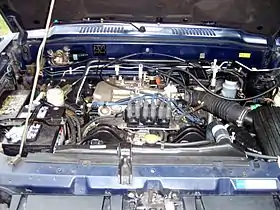Isuzu V engine
The Isuzu V engine is a family of all-aluminum 75° V6 gasoline engines produced by Isuzu. They feature either a belt-driven SOHC or DOHC valvetrain. Later versions feature direct ignition as well as gasoline direct injection. These engines are notable for their early adoption of gasoline direct injection technology and also for their uncommon 75° cylinder head bank angle.
| Isuzu V engine | |
|---|---|
 Isuzu 6VD1 SOHC Engine | |
| Overview | |
| Manufacturer | Isuzu |
| Production | 1992-2004 |
| Layout | |
| Configuration | 75° V6 |
| Displacement |
|
| Cylinder bore | 93.4 mm (3.68 in) |
| Piston stroke |
|
| Block material | Aluminum |
| Head material | Aluminum |
| Valvetrain | |
| Combustion | |
| Fuel system | |
| Fuel type | Gasoline |
| Oil system | Wet sump |
| Cooling system | Water-cooled |
| Chronology | |
| Predecessor | General Motors LG6 engine |
6VD1
- The 6VD1 3.2L SOHC V6 was used from 1993-1997. This engine featured 175 hp (at 4,888 rpms) with 188ft/lbs of torque from 1993-1995 and 190 hp from 1996-1997.[1] In 1998, the same engine was available in DOHC form with 195 hp until 2002 with the termination of the Isuzu Trooper as the 6VD1W. Both versions feature a 93.4 mm (3.68 in) bore and a 77.0 mm (3.03 in) stroke, giving it a total displacement of 3,165 cc (193.1 cu in).
Applications:
6VE1
- The 6VE1W 3.5L DOHC 24V V6 was introduced in 1998 with 215 hp (160 kW) and used until 2004 with the termination of the Isuzu Axiom. Gasoline direct injection was added for 2004 only and boosted output to 230 hp (172 kW). This was a stroked version of the 6VD1; having an 85.0 mm (3.35 in) stroke and a total displacement of 3,494 cc (213.2 cu in).
Applications:
References
- "Isuzu Rodeo specs". Edmunds.com. Retrieved Feb 25, 2016.
This article is issued from Wikipedia. The text is licensed under Creative Commons - Attribution - Sharealike. Additional terms may apply for the media files.